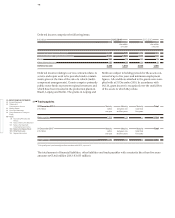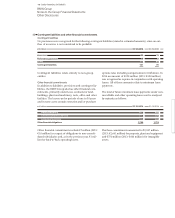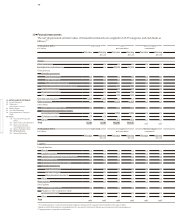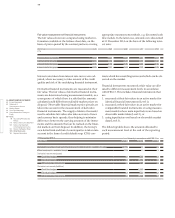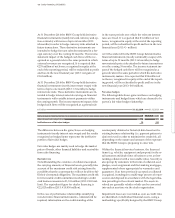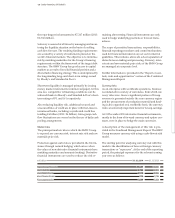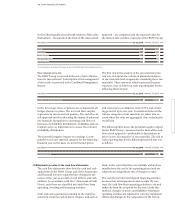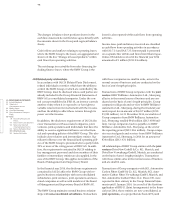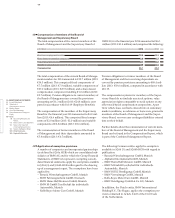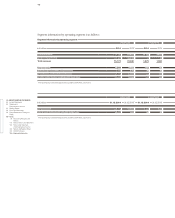BMW 2014 Annual Report Download - page 157
Download and view the complete annual report
Please find page 157 of the 2014 BMW annual report below. You can navigate through the pages in the report by either clicking on the pages listed below, or by using the keyword search tool below to find specific information within the annual report.
157 GROUP FINANCIAL STATEMENTS
At 31 December 2014 the BMW Group held derivative
financial instruments (mainly forward currency and op-
tion contracts) with terms of up to 60 months (2013:
60 months) in order to hedge currency risks attached to
future transactions. These derivative instruments are
intended to hedge forecast sales denominated in a for-
eign
currency over the coming 60 months. The income
statement impact of the hedged cash flows will be
rec-
ognised as a general rule in the same periods in which
external revenues are recognised. It is expected that
€ 278 million of net losses, recognised in equity at the
end of the reporting period, will be reclassified to profit
and loss in the new financial year (2013: net gains of
€ 162 million).
At 31 December 2014 the BMW Group held derivative
financial instruments (mostly interest rate swaps) with
terms of up to one month (2013: 13 months) to hedge
interest rate risks. These derivative instruments are in-
tended to hedge interest-rate risks arising on financial
instruments with variable interest payments within
the coming month. The income statement impact of the
hedged cash flows will be recognised as a general rule
in the same periods over which the relevant interest
rates are fixed. It is expected that € 1 million of net
losses, recognised in equity at the end of the reporting
period, will be reclassified to profit and loss in the new
financial year (2013: € – million).
At 31 December 2014 the BMW Group held derivative
financial instruments (mostly commodity swaps) with
terms of up to 59 months (2013: 60 months) to hedge
raw materials price risks attached to future transactions
over the coming 59 months. The income statement im-
pact of the hedged cash flows will be recognised as a
general rule in the same period in which the derivative
instruments mature. It is expected that € 54 million of
net losses, recognised in equity at the end of the report-
ing period, will be reclassified to profit and loss in the
new financial year (2013: € 60 million).
Fair value hedges
The following table shows gains and losses on hedging
instruments and hedged items which are deemed to be
part of a fair value hedge relationship:
The difference between the gains / losses on hedging
instruments (mostly interest rate swaps) and the results
recognised on hedged items represents the ineffective
portion of fair value hedges.
Fair value hedges are mainly used to hedge the market
prices of bonds, other financial liabilities and receivables
from sales financing.
Bad debt risk
Notwithstanding the existence of collateral accepted,
the carrying amounts of financial assets generally take
account of the maximum credit risk arising from the
possibility that the counterparties will not be able to ful-
fil
their contractual obligations. The maximum credit risk
for irrevocable credit commitments relating to credit
card business amounts to € 1,181 million (2013: € 943
mil-
lion). The equivalent figure for dealer financing is
€ 22,025 million (2013: € 19,856 million).
In the case of performance relationships underlying
non-derivative financial instruments, collateral will be
required, information on the credit-standing of the
counterparty obtained or historical data based on the
existing business relationship (i. e. payment patterns to
date) reviewed in order to minimise the credit risk, all
depending on the nature and amount of the exposure
that the BMW Group is proposing to enter into.
Within the financial services business, the financed
items (e. g. vehicles, equipment and property) in the
re-
tail customer and dealer lines of business serve as first-
ranking collateral with a recoverable value. Security is
also put up by customers in the form of collateral asset
pledges, asset assignment and first-ranking mortgages,
supplemented where appropriate by warranties and
guarantees. If an item previously accepted as collateral
is acquired, it undergoes a multi-stage process of repos-
session and disposal in accordance with the legal situa-
tion prevailing in the relevant market. The assets
in-
volved are generally vehicles which can be converted
into cash at any time via the dealer organisation.
Impairment losses are recorded as soon as credit risks
are identified on individual financial assets, using a
methodology specifically designed by the BMW Group.
in € million 31. 12. 2014 31. 12. 2013
Gains / losses on hedging instruments designated as part of a fair value hedge relationship 369 – 525
Gains / losses from hedged items – 359 503
Ineffectiveness of fair value hedges 10 – 22



